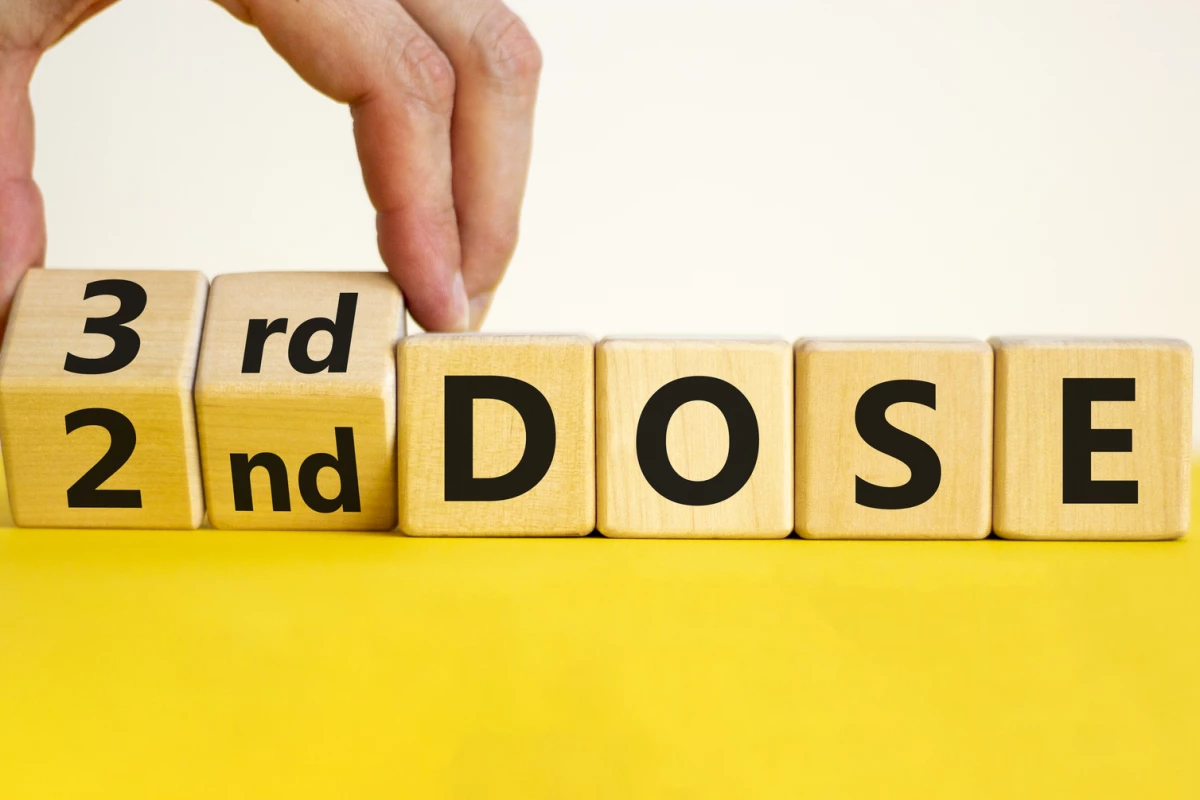A trio of new studies from the Centers for Disease Control and Prevention (CDC) offer the first real-world insights into the effectiveness of a third COVID-19 vaccine dose against the rapidly spreading Omicron variant of SARS-CoV-2. The research confirms a third vaccine dose significantly restores protection from infection and hospitalization against the omicron variant.
In the space of less than three months, the SARS-CoV-2 variant dubbed Omicron has spread to almost every corner of the globe. While early data out of South Africa offered some insights into how this new variant can break through pre-existing vaccine-induced immunity, only now are researchers getting a clear understanding as to how important a third COVID vaccine dose is in the face of Omicron.
The first new CDC study tracked COVID-related hospitalizations and emergency room visits from August 2021 to early January 2022, and compared two-dose and three-dose vaccine effectiveness between the Delta and Omicron waves.
The data clearly illustrates how two doses of an mRNA vaccine are significantly less protective against severe disease from Omicron compared to delta. However, a third dose notably increases that protection against both variants.
NEW: Today's @CDCMMWR study found that during periods of both #DeltaVariant and #OmicronVariant, a 3rd dose was highly effective at preventing #COVID19 associated emergency department visits, urgent care visits & hospitalizations. https://t.co/X8chSXviW7 pic.twitter.com/OMtvSgZU1J
— Rochelle Walensky, MD, MPH (@CDCDirector) January 21, 2022
Six months after two mRNA vaccine doses the data still found the vaccine 76 percent effective at preventing emergency room and urgent care visits for Delta infections. But that protection dropped to 38 percent in the face of Omicron. The good news is that a third mRNA vaccine dose lifted that protection against Omicron up to 82 percent.
Two-dose protection from hospitalization was similarly low against Omicron compared to Delta (81 percent vs 57 percent). But again, a third dose spiked effectiveness up to over 90 percent against both variants.
The second study looked at COVID infections and deaths from April 2021 to the end of the year. At the peak of the Delta wave the study found two-dose vaccination reduced risk of death from COVID 12-fold and three-dose vaccination reduced risk of death 53-fold, compared to the unvaccinated.
A third vaccine dose was found to significantly reduce a person’s chances of Omicron infection compared to two-dose vaccine. And while protection from Omicron death was still strong after two-doses, a third vaccine dose spiked protection from COVID death up to 98 percent.
“In 25 U.S. jurisdictions, decreases in case incidence rate ratios for unvaccinated versus fully vaccinated persons with and without booster vaccine doses were observed when the Omicron variant emerged in December 2021,” the study concluded. “Protection against infection and death during the Delta-predominant period against infection during Omicron emergence were higher among booster vaccine dose recipients, and especially among persons aged 50–64 and ≥65 years.”
The final study, published in the journal JAMA, homed in on 70,000 symptomatic COVID cases recorded in the month from early December 2021 to early January 2022. The findings revealed those receiving three vaccine doses were 66 percent less likely to develop a symptomatic Omicron infection compared to those receiving two vaccine doses.
The study pointed out those more than six months past their second vaccine dose were as likely to develop a symptomatic Omicron infection as those unvaccinated. Of course, the severity of disease in the two-dose cohort was significantly decreased compared to the unvaccinated.
The study also noted that the evidence indicated a person experiencing a breakthrough Omicron infection after three vaccine doses is likely much less infectious compared to a breakthrough infection after two doses.
Current CDC guidelines recommend all Americans over the age of 12 should receive a third COVID-19 vaccine dose five months after their second dose. Less than half of Americans eligible for a third vaccine dose have taken up the free shot. Rochelle Walensky, CDC director, said in a press briefing this new data affirms the need for everyone eligible to get their third vaccine dose.
"These reports add more evidence to the importance of being up to date with COVID vaccinations – that means getting primary series, and boosted when eligible to protect against severe COVID 19," said Walensky.
At the press briefing Walensky was notably reticent to foreshadow definitions of being "fully vaccinated" shifting to require a third dose. Instead, she said the CDC would be “pivoting” its language surrounding COVID vaccination.
"If you are eligible for a booster and you haven't gotten it, you're not up to date and you need to get your booster in order to be up to date," Walensky said. "What we really are working to do is pivot the language to make sure everybody is as up to date with their COVID-19 vaccines as they personally could be.”
As far back as September 2021, Anthony Fauci, director of the US National Institute of Allergy and Infectious Diseases, suggested it is likely mRNA COVID-19 vaccines would require three doses to be fully effective. Talking last year about why this shift from two to three doses may be necessary, Fauci explained that in the context of a pandemic the most pressing need is to save lives. This is why the definition of "fully vaccinated" in 2021 only relied on two doses a few weeks apart, but moving forward Fauci said a three-dose primary course would probably be the standard protocol for effective vaccination.
“It should be a proper one from the get-go – three shots,” Fauci said last year. “And the reason we didn’t know that right away was because we were dealing with such an emergency situation that we needed to show the vaccine was effective and safe, which we did with the two shots. And we needed to implement that to save lives, which we have, probably already saved millions of lives.”
The two new CDC studies can be found here and here. The third new study was published in the journal JAMA.




